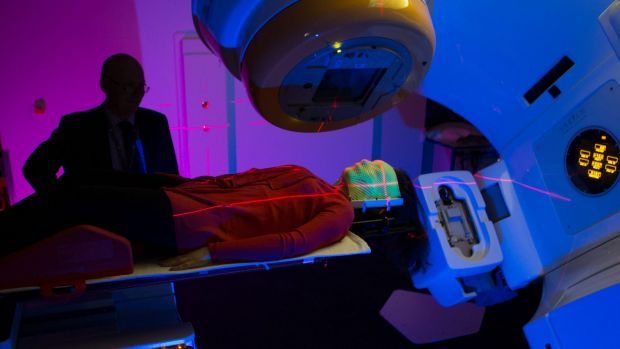
Patients with brain tumours can be treated with new technology that spares the memory. Photo: Jason South
Doctors are hoping new technology will shrink people’s brain tumours without the debilitating side effects of current treatments, including memory loss.
Every year, thousands of Australians are diagnosed with brain tumours and usually they are secondary to other cancers found in their bodies.
While the current standard treatment is the application of radiation to their entire brain, this technique often causes hair loss, memory loss and other cognitive deficits that can reduce people’s quality of life.

Doctors at Epworth hospital hope to run clinical trials on new technology to treat brain tumours later this year. Photo: Supplied
But radiation oncologist at Epworth hospital, Michael Dally, said new technology called stereotactic irradiation meant radiation could be applied more precisely to up to 10 brain tumours at once, whereas in the past it was limited to a maximum of three tumours.
He said the treatment, which has shown positive results in a Japanese study, is only available at the Epworth hospital. But he said the hospital was hoping to run a clinical trial later this year with Melbourne University to offer it to patients for free.
“We want to prove that there are no harmful effects on people’s cognitive abilities, their quality of life, or their neurological functioning,” he said, adding that the treatment is painless.
“It’s like having a chest X-ray. I’m hoping with this treatment that there won’t even be much hair loss.”
Dr Dally said with better cancer treatments allowing people to live longer, an increasing number of people were getting brain tumours towards the end of their lives. For this reason, he said new, better treatments were needed.
The first Australian patient to have the treatment said she was hopeful it would help keep her well for longer while she continues with drug therapies for melanoma that has spread to her brain and lungs.
The woman, who did not want to be named, said she was devastated by the prospect of having whole brain radiation because she was currently feeling fit and well and wanted to get the most out of her day to day life.
“You want to have control over your life, keep your faculties and not feel hopeless,” she said.
The woman, aged in her 40s, said although she experienced some hair loss after two treatments on 20 tumours in her brain, it was nowhere near the hair loss she expected from whole brain radiation.
“I think it shows you should shop around and find out what your options are,” she said.
